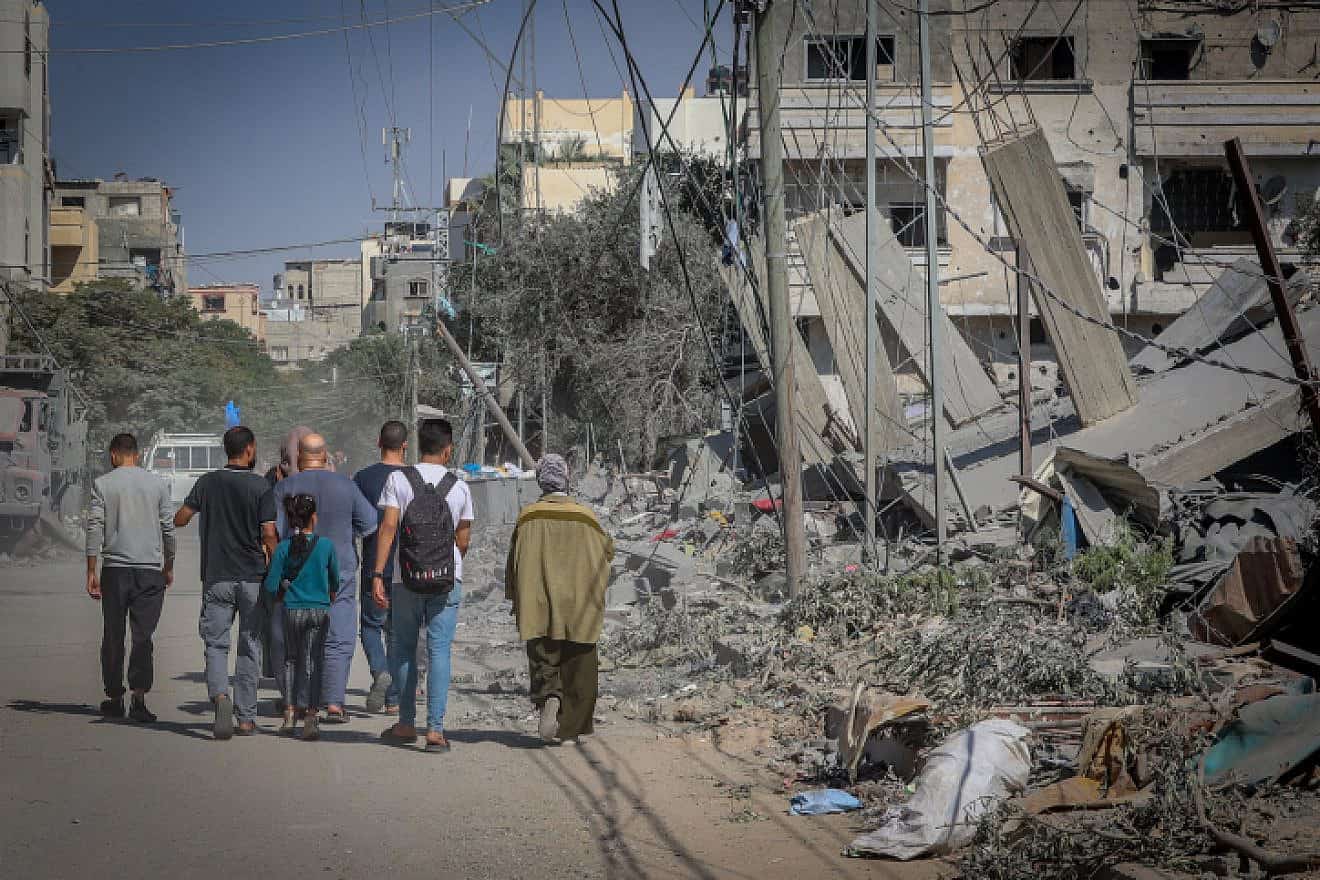In order to succeed in its mission of destroying Hamas in the Gaza Strip, Israel has no choice but to reconquer the entire enclave and eradicate all elements of the Hamas movement. Because of Hamas’s strategy of embedding itself within the non-combatant population, completing this mission will necessarily bring great devastation to the civilian infrastructure in Gaza. To shorten the time and extent of this devastation, Gazans must be allowed to seek temporary refuge outside of the densely-populated territory.
Currently, Israel has called for noncombatants to evacuate the northern Strip around Gaza City and move towards the south. But in order to root out Hamas, Israel will have to conquer southern Gaza as well. Otherwise it will become a new base for Hamas to continue its genocidal war on Israel.
The humanitarian implications are already grave, but will certainly worsen once Israel turns south. Preventing Gazans from leaving will cause a large number of civilian casualties, which is precisely what Hamas wants.
There are already thousands of Gazans seeking to escape the warzone, but are trapped by Hamas and the Egyptians’ refusal to open border crossings. This is unjustifiable and must be changed. Forcing Israel to carry out its mission in the difficult environment of urban warfare amongst a large noncombatant population will inevitably result in the deaths of more noncombatant Gazans, extend the length of the war and exacerbate the humanitarian crisis.
Wars in densely-populated urban areas inevitably result in large numbers of displaced civilians. Naturally, many of these people seek temporary refuge outside of the warzone. In past decades, this has been allowed to occur in numerous cases, which sometimes involved the displacement of hundreds of thousands and even millions of people.
Since Russia’s invasion of Ukraine, for example, over six million Ukrainians have escaped the country. Adjacent Poland has received 1.2 million Ukrainians and provided them with shelter and food. Additional countries have likewise accepted vast numbers of Ukrainians, including a million in Germany and half a million in the Czech Republic.
During the Syrian civil war, which has been ongoing since 2011, 6.7 million Syrians have left Syria. In this case as well, adjacent countries and others in the region have given them refuge, including 3.2 million in Turkey, 789,000 in Lebanon and 653,000 in Jordan. Even Egypt has taken in 150,000 Syrians. Additional Middle Eastern and European states have accepted hundreds of thousands. Notably, Kuwait and Saudi Arabia have offered resident status to 120,000 and 100,000 Syrians, respectively.
Why, then, are no Gazans permitted to flee and seek temporary refuge elsewhere?
First, Hamas itself is cynically holding them hostage in order to use them as human shields. It wants these people to die so their bodies can be paraded in the international media to build pressure on Israel to stop short of its mission of destroying the terror group. Forcing these people to remain in Gaza would be playing right into Hamas’s hands.
Second, as noted, Egypt is refusing to let them out. It has claimed that it cannot accept additional refugees and is concerned that Hamas terrorists will cross into Sinai. These may be reasonable concerns, but they can be addressed with external funding, close vetting of the fleeing Gazans, establishing tent cities for the displaced and allowing passage to third parties.
An additional reason given by Egypt, which is entirely unreasonable, is that if Gazans are allowed to leave, it may undermine the long-term goals of the Palestinian national movement. This is unjustifiable. It should be up to Gazans to decide whether they want to sacrifice their lives for national goals, not Egypt. If Gazans seek to leave, this is their choice. They should not be blocked by Egypt due to political considerations.
Therefore, an international initiative should be established to assist Gazans who are seeking temporary refuge in other countries. Once the war is over and Hamas has been eradicated, they are free to return. But forcing them to remain in the warzone will play into Hamas’s hands, risk their lives, extend the time it will take to complete Israel’s mission and deepen the humanitarian crisis.
Some countries bear a direct responsibility for Hamas’s actions and should be held accountable by requiring them to be part of the solution. Turkey, Qatar and Iran have been actively supporting Hamas for decades. They should take in the majority of the displaced. Additional countries that could host displaced Gazans are North African countries like Algeria, Libya and Tunisia; South America, where Chile already hosts a large Palestinian population; European countries; and Canada. Arab countries that are not supportive of Hamas, such as Saudi Arabia and the UAE, may be open to providing resources to help their Arab brethren. There is already a grassroots movement in the Russian Caucuses to host Gazans. The UAE is working to bring 1,000 injured children to Emirati hospitals.
Anyone who truly cares about the plight of Gazans should join the initiative to let them out and offer to host the displaced. Israel is not responsible for current conditions in Gaza. That responsibility rests with Hamas, along with all the countries that have aided it over the years. The idea that in all other warzones noncombatants are permitted to flee and offered refuge but Gazans must stay and serve as human shields for Hamas is nothing but a cynical ploy. It seeks to exploit Gazans as tools of war and will lead to unnecessary loss of life.





























